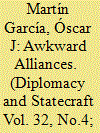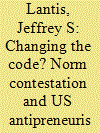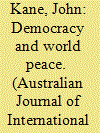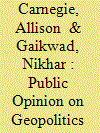|
|
|
Sort Order |
|
|
|
Items / Page
|
|
|
|
|
|
|
| Srl | Item |
| 1 |
ID:
183156


|
|
|
|
|
| Summary/Abstract |
A body of literature on Cold War international history has studied the influence of modernisation theory in United States foreign relations with its authoritarian allies in the Third World during the 1950s and 1960s. However, this area of research has been much less interested in those Washington-friendlydictatorships that, as in the case of Francisco Franco’s regime in Spain, do not fit into the Third World analytical framework. This analysis assesses the contribution of modernisations doctrine principles to American foreign policy towards the Spanish dictatorship in the 1960s and considers how this theory provided the conceptual tools to justify the American collaboration with the Franco regime in the name of development, security, and long-term democratisation. It examines the role of modernisation as, on one hand, an interpretative framework for Spain’s economic and social evolution during that decade and, on the other, an instument of political legitimisation serving American strategic interests. In this way, this work sheds light on the ideological and intellectual underpinnings of the American alliance with the Franco dictatorship in a period of great challenges and transformations in Spain.
|
|
|
|
|
|
|
|
|
|
|
|
|
|
|
|
| 2 |
ID:
159971


|
|
|
|
|
| Summary/Abstract |
Cyberspace appears to offer limitless possibilities for collaboration and economic opportunity in the twenty-first century, but cyber-attacks, breaches of privacy, and security threats also have become commonplace. In the face of these challenges, a number of governments have been locked in debates over the future of cyberspace governance, including the Russian Republic, the People’s Republic of China, and the United States. This study examines the ongoing contestation of the international normative architecture for cyberspace, with a focus on the United States’ role as a norm ‘antipreneur’, seeking to defend the status quo multi-stakeholder norm for a more open Internet from entrepreneurial efforts by Russia and China to establish multilateral governance with ‘cyber-sovereignty’. Drawing on recent advances in constructivist theory, the study explores antipreneurial strategies to contest efforts by entrepreneurs to introduce new norms, as well as implications for norm development and change. Process tracing is employed to examine cyberspace governance debates. The study concludes by discussing prospects for an International Code of Conduct for Cyberspace, as well as theoretical and political implications of antipreneurship in modern norm contestations.
|
|
|
|
|
|
|
|
|
|
|
|
|
|
|
|
| 3 |
ID:
114152


|
|
|
|
|
| Publication |
2012.
|
| Summary/Abstract |
When liberal democracies pursue idealistic goals they invite accusations of naivety and impracticality; if they act on strictly realistic premises they are accused of hypocrisy or betrayal of ideals. The author explores the consequences of this idealism-realism dilemma using the example of United States foreign policy and the particular case of Woodrow Wilson and the Covenant of the League of Nations. The author examines its theoretical roots by analysing the work of Immanuel Kant, who laid down the influential moral-political ideal of a democratic peace but posited so stark a theoretical gulf between morality and politics as to make the ideal seem unreachable. Kant tried to show how a world resistant to morality might nevertheless evolve towards one in which moral action had real political effect-a necessary condition, he believed, for an international federation of republics committed to peaceful coexistence. The implausibility of his account reveals the problematic nature of the idealism-realism divide, but also, in its attempt to bridge that divide, points the way towards a genuinely ethical-practical foreign policy founded in political prudence.
|
|
|
|
|
|
|
|
|
|
|
|
|
|
|
|
| 4 |
ID:
082929


|
|
|
|
|
| Publication |
2008.
|
| Summary/Abstract |
Is the United States inevitably in decline? After the foreign policy controversies of the George W. Bush years, a new consensus declares the end of American dominion. In this article this conventional wisdom is challenged. The US constitutes an 'exceptional empire' and, despite the recent rise of powers such as the EU, China and India, the four foundations of this distinctive empire remain robust. First, the US still exhibits global predominance in hard power. Second, the essentially unipolar international order shaped by Washington remains resilient. Third, neither the rise of 'anti-Americanism' nor the alleged decline of US 'soft power' endanger its predominance. Fourth, the US political class is committed to preserving American primacy after Bush. No other power is currently in range of competing with the US for global influence. Moreover, each faces powerful internal weaknesses and external threats at least as significant as those facing the US. America's global predominance in hard and soft power do not translate into omnipotence. Nor does predominance promise an error-free foreign policy. The US nonetheless continues to defy both history and theory
|
|
|
|
|
|
|
|
|
|
|
|
|
|
|
|
| 5 |
ID:
135221


|
|
|
|
|
| Summary/Abstract |
This essay looks back on three classic texts depicting Canadian foreign policy during the Vietnam era in pursuit of lessons for policymakers in Ottawa today. It concludes that Canadians should not be so self-critical of their country’s inability to exercise influence on complex and difficult global problems. While Canada continues to be able to make a helpful contribution to world affairs, Canada’s international engagements should focus less on the often unrealistic desire to enhance the country’s image and standing abroad and at home and more on immediate tactical and operational impacts.
|
|
|
|
|
|
|
|
|
|
|
|
|
|
|
|
| 6 |
ID:
185603


|
|
|
|
|
| Summary/Abstract |
This article provides a systematic examination of the role of security considerations in shaping mass preferences over international economic exchange. The authors employ multiple survey experiments conducted in the United States and India, along with observational and case study evidence, to investigate how geopolitics affects voters’ views of international trade. Their research shows that respondents consistently—and by large margins—prefer trading with allies over adversaries. Negative prior beliefs about adversaries, amplified by concerns that trade will bolster the partner's military, account for this preference. Yet the authors also find that a significant proportion of the public believes that trade can lead to peace and that the peace-inducing aspects of trade can cause voters to overcome their aversion to trade with adversaries. This article helps explain when and why governments constrained by public opinion pursue economic cooperation in the shadow of conflict.
|
|
|
|
|
|
|
|
|
|
|
|
|
|
|
|
| 7 |
ID:
167231


|
|
|
|
|
| Summary/Abstract |
This essay examines how the history of the Cold War in Southeast Asia has shaped, and will likely continue to shape, the current Sino-US rivalry in the region. Expert commentary today typically focuses on the agendas and actions of the two big powers, the United States and China, which actually risks missing the bigger picture. During the Cold War, leaders of ASEAN (Association of Southeast Asian Nations) played a critical role in containing Chinese influence, shaping the terms of Sino-US competition and rapprochement, and deepening the US presence in Southeast Asia. The legacy of ASEAN’s foreign relations during and since the Cold War imposes constraints on Chinese regional ambitions today, which militates against the popular notion that Chinese hegemony in East and Southeast Asia is inevitable. This essay underscores that current analyses of the brewing crisis in and around the South China Sea must routinely look beyond the two superpowers to the under-appreciated agency of small- and middle-sized ASEAN actors who, in reality, are the ones who hold the fate of the region in their hands.
|
|
|
|
|
|
|
|
|
|
|
|
|
|
|
|
| 8 |
ID:
165101


|
|
|
|
|
| Summary/Abstract |
The United States has repeatedly intervened militarily in situations where tactical success on the battlefield did not translate into meaningful political resolution of the issues triggering the introduction of military force. Although US military interventions are hardly a recent phenomenon, a series of systemic, political and institutional developments over the past several decades have been particularly conducive to the limited use of force as a policy option. These factors have reduced the costs and risks of military intervention, incentivising the use of force in situations when it may not be the optimal policy response.
|
|
|
|
|
|
|
|
|
|
|
|
|
|
|
|
|
|
|
|
|